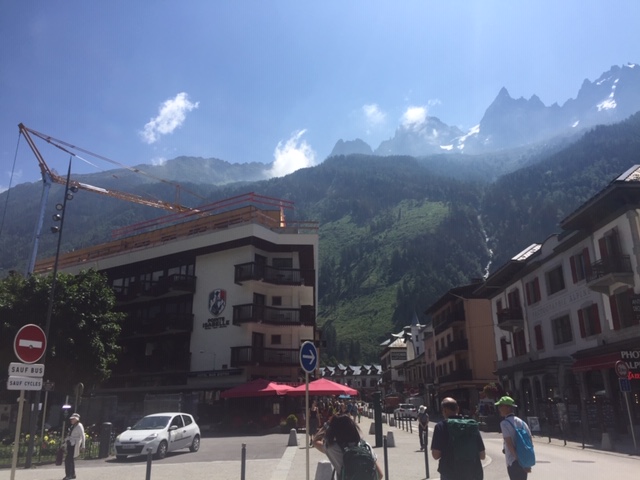My First Realization
The day before my Haute Route trek, I was in Chamonix, France and took advantage of the chance to meet with a friend. On our way to tour the town, I could see my friend crossing the street out of the corner of my eye. I wondered why as I gravitated across the street with her. She pointed up, drawing my attention to a construction crane that would have been right above our heads. She chuckled a little and taught me about the concept of personal responsibility in Europe.

Personal Responsibility – What it is
After having experienced 22 days in France and Switzerland, I came to learn what personal responsibility means. There was certainly an adjustment period of tripping off of curbs. Personal responsibility is a principle or belief that individuals have common sense and the responsibility to watch out for themselves, and what happens to them is a direct result of their actions. This includes paying attention to what is above, below, around, behind and in front of themselves.

For example, if I had walked under the crane and something fell on me, it would have been my fault the load fell on me because I walked under the crane. In America, the fault would likely fall on the owner/operator of the crane for not better securing the load.
Practice, practice
It took me a little while to realize it was normal in Europe to have unmarked stairs of different heights, doors with low door frames, uneven steps, rising street poles et cetera. In addition to that, cranes and construction sites often function with little to no safety fences and parameters. In America, there are specific rules and regulations that require individuals and organizations to adhere to certain standards and place warning markings as necessary.

For example, in America, there are many government construction zones safety requirements. Construction zones are well marked, barricaded, low doorways often have signs that read “watch your head”, uneven sidewalk slabs are shaved down to prevent tripping and uneven stairs often have yellow and black safety strips. Precautions are posted by potentially liable parties in an effort to prevent law suits. I realized all of these warning signs in America, though helpful, made me truly blind to watching out for myself. Personal responsibility requires focus, attention, and awareness. Practicing personal responsibility dramatically increased my safety. I didn’t find myself tripping off curbs, in the middle of construction zones and potentially getting hit by vehicles.
Improvement solves the problem
As I practiced personal responsibility, I was surprised to learn how much more analytical I became. I lived in the moment, even looked ahead and anticipated what was next. Life was so much more enjoyable with unobstructed views, being able to look out from a bridge rather than through chain link fences. Watching out for myself, I could see whether steps were steps and not just black asphalt leveled with a stair. I feel like personal responsibility is so much more than looking out for myself, it is looking ahead for what is coming, opening my eyes (literally) and enjoying the journey of life. Regardless of where you are traveling, practice the principle of personal responsibility. Not just for safety reasons but for the over-all enjoyment of your adventures. Happy travels!

- Long Flight Tips - March 10, 2020
- Book A Flight - February 11, 2020
- Christmas in Switzerland: An Overview - December 17, 2019


